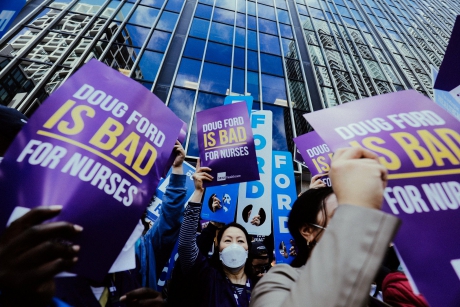Fight Ford!
You are here
Ontario Health Coalition maps out fall strategy

July 8, 2022
Activists in the Ontario Health Coalition (OHC) met on Tuesday, June 28 to look at the OHCs recent activities around the provincial election campaign, to look at the lay of the land in terms of healthcare in Ontario, and to map out a strategy moving into the Fall of ’22.
In response to Health Minister Christine Elliott’s winter announcement, coming at the tail end of a news conference, that the Tories were looking to ‘private hospitals’ to alleviate the overload in the public system, the OHC mobilized province-wide. Twenty different local groups held well attended healthcare summits in their localities. A lawn sign and sticker campaign was initiated. Hard hitting videos circulated regarding the dangers of private healthcare. As a result of such action, the Tories took a step back from Elliott’s announcement.
At the strategy session, local coalitions reported that during the campaign, they continued to pressure the Tories by tabling at local markets and on street corners, and linking to local media. A thread ran through the reports – links throughout the province with the labour movement, especially healthcare workers represented by ONA, OPSEU, CUPE, SEIU and Unifor. Many local coalitions attended the May 1st mobilizations for a ‘workers first’ agenda, called by the Ontario Federation of Labour, deepening those links.
With a renewed Tory majority at Queen’s Park – no mandate to privatize, as they received only 17% of eligible votes – the Tories are likely to move ahead on their pre-election plans including more public funds going in to private, for-profit Long-Term Care (LTC) homes, coupled with a phase-out of inspections – allowing the industry to ‘police itself’, as is common in the US. New beds in LTCs will go to those private homes where seniors suffered the highest death rate during Covid.
Hospitals continue to be at the breaking point in terms of burnout due to staffing shortages, with the shortfall in staff in the tens of thousands. Bill 124, the Tories’ legislation removing the right to bargain wages and benefits in the public sector, limiting settlements to a 1% increase (while inflation is close to 8%), continues to hollow out the complement of nurses and other skilled healthcare professionals in the public sector. This is clearly a repeat of the Harris Tories’ strategy in the mid 1990’s of creating a crisis in order to impose their own solution – private delivery of healthcare services. This is already the case with Covid tests and vaccinations.
Also hearkening back to the Harris era is the Tory policy on homecare. They propose to re-introduce competitive bidding as was introduced in the 1990’s, allowing private homecare companies, mostly non-union, to under bid not-for-profit agencies, many of whom are unionized. To add insult to injury of those in need of homecare services, the Tories have proposed that instead of the Local Health Integration Networks (LHINs) making decisions on the appropriate care needed, it will be those very private healthcare corporations who are set to take over awarding contracts in homecare – a clear conflict of interest. The Ford government is set to put the profiteers in charge in the homecare sector, as they are doing in the LTCs.
Attendees at the strategy session looked to continue an activist strategy into the Fall, to bring to light the extent of privatization, and its threat to public healthcare. Crucially important was a commitment to continue to link up with unionized healthcare workers on the frontlines of healthcare delivery. This will include ongoing OHC support for ending Bill 124, which will bring many public sector workers, including those in healthcare on a crash course with the Tories in coming bargaining rounds. With solidarity from OHC activists, building public supports for potential job action, public sector wage and benefit restraint and erosion of service can be pushed back. It will require unity in struggle on the ground between community members and labour to turn the tide. The public medicare system was brought in through the struggles of working class people – it’s in our interest to fight together so we can keep it that way and bring the much needed improvements we need.
For more information see the Ontario Health Coalition website at: https://www.ontariohealthcoalition.ca/
Section:
Topics:









